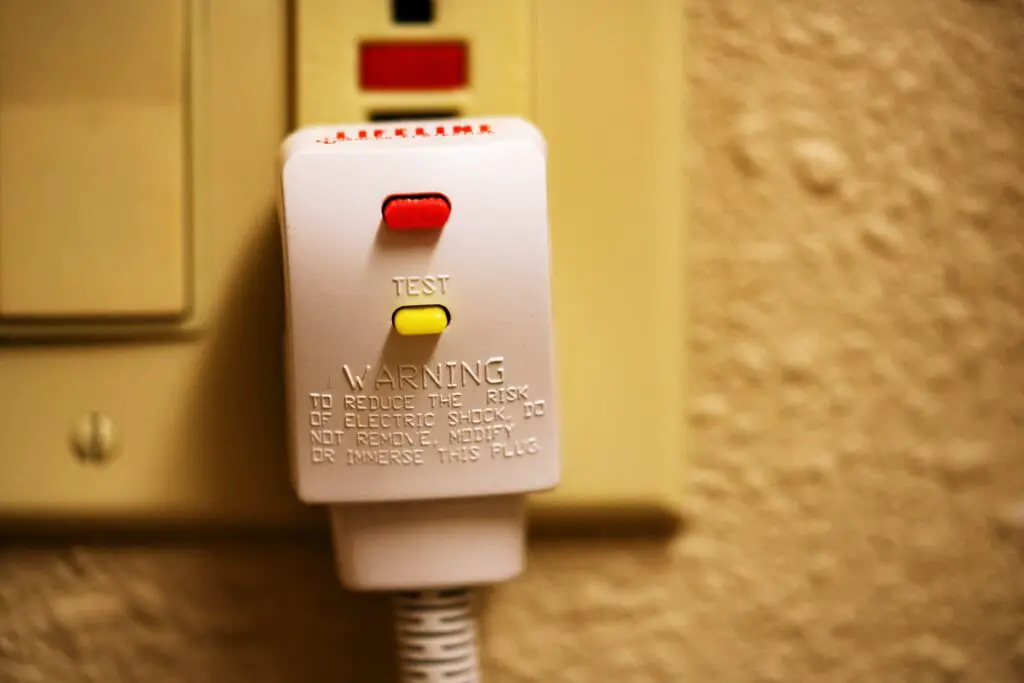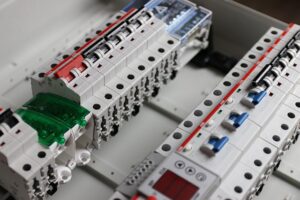Electrical fires are a serious and common threat to the safety of households and workplaces. To prevent them, we rely on various electrical safety devices and measures, one of which is the Ground Fault Circuit Interrupter (GFCI).
In this article, we will discuss how GFCIs protect against electrical fires and their benefits in electrical safety.
Table of Contents
What is a GFCI?
A Ground Fault Circuit Interrupter (GFCI) is an electrical safety device that protects against electrical shocks and electrocution.
GFCIs work by detecting and interrupting any imbalances or leaks of electrical current, such as those caused by a faulty or damaged electrical device or wiring.
GFCIs can be installed in different electrical outlets, including wall outlets, extension cords, and outdoor outlets.
They are typically identified by their unique test and reset buttons and their distinct design, which includes a built-in sensor that monitors the flow of electrical current.
How do GFCIs prevent electrical fires?
GFCIs are primarily designed to protect against electrical shocks, but they can also prevent electrical fires in some cases. Here are some ways GFCIs help prevent electrical fires:
- Detecting electrical faults: GFCIs can detect faults in electrical devices and wiring, which can cause electrical fires. By interrupting the electrical circuit when it detects a fault, GFCIs prevent the overheating and subsequent ignition of electrical devices and wiring.
- Preventing overloading: Overloading of electrical circuits is a common cause of electrical fires. GFCIs help prevent overloading by detecting when there is an imbalance in the electrical current, such as when too many devices are connected to a single circuit. When an overload is detected, the GFCI shuts off power to the circuit.
- Protecting against electrical arcs: Electrical arcs occur when electricity jumps from one conductor to another. They can cause sparks and heat, which can ignite nearby flammable materials and start a fire. GFCIs can protect against electrical arcs by detecting and interrupting the electrical circuit when an arc is detected.
- Outdoor safety: GFCIs are required by the National Electrical Code to be installed in outdoor electrical outlets to prevent electrocution and electrical fires. Outdoor outlets are more vulnerable to moisture and weather-related damage, which can increase the risk of electrical faults and fires.
Read my article GFCI Tripping for no reason! here are the reasons.
Benefits of GFCIs in electrical safety:

Apart from preventing electrical fires, GFCIs offer several other benefits in electrical safety. Here are some of them:
- Protection against electrical shocks: GFCIs are designed to protect against electrical shocks and electrocution, which can be life-threatening. They can detect and interrupt imbalances in electrical current as low as 5 milliamperes, which is much lower than the amount of current needed to cause serious injury or death.
- Compliance with safety codes: GFCIs are required by the National Electrical Code to be installed in various areas, including bathrooms, kitchens, outdoor areas, and garages. Installing GFCIs in these areas helps ensure compliance with safety codes and prevents electrical accidents.
- Easy to install: GFCIs can be easily installed in existing electrical outlets without the need for rewiring or special tools. They are also available in various types and designs to suit different needs and preferences.
- Cost-effective: GFCIs are relatively inexpensive compared to the potential costs of electrical accidents and fires. Installing GFCIs is a cost-effective way to enhance electrical safety in homes and workplaces.
GFCIs vs. AFCIs:
Apart from GFCIs, another type of electrical safety device that protects against electrical fires is the Arc Fault Circuit Interrupter (AFCI). AFCIs work by detecting and interrupting electrical arcs, which can cause electrical fires.
While both GFCIs and AFCIs offer protection against electrical fires, they have different functions and applications.
GFCIs are primarily designed to protect against electrical shocks and electrocution, while AFCIs are designed to protect against electrical fires caused by arcing.
AFCIs are required to be installed in certain areas of the home, such as bedrooms and living rooms, while GFCIs are required in areas with a higher risk of electrical shocks, such as bathrooms, kitchens, and outdoor areas.
Comparison table:
Here’s a comparison table that summarizes the differences between GFCIs and AFCIs:
| GFCIs | AFCIs | |
|---|---|---|
| Function | Protect against electrical shocks and electrocution | Protect against electrical fires caused by arcing |
| Application | Required in areas with a higher risk of electrical shocks, such as bathrooms, kitchens, and outdoor areas | Required in certain areas of the home, such as bedrooms and living rooms |
| Detection | Detects imbalances or leaks of electrical current | Detects and interrupts electrical arcs |
| Installation | Can be easily installed in existing electrical outlets | Requires a dedicated circuit and professional installation |
| Cost | Relatively inexpensive | More expensive than GFCIs |
Conclusion:
In conclusion, GFCIs can protect against electrical fires by detecting and interrupting electrical faults, preventing overloading, protecting against electrical arcs, and ensuring outdoor safety.
GFCIs offer several benefits in electrical safety, including protection against electrical shocks, compliance with safety codes, ease of installation, and cost-effectiveness.
While AFCIs also offer protection against electrical fires, they have different functions and applications compared to GFCIs.
Don’t Leave Empty-Handed!
Install my Free Android App on Google Play:
Electrical Cables Most Common Tables “Cables Tables”
And, my Electrical Calculations App “Fast Electrical Calculator”
Discover more great content by subscribing to My channel
Looking to stay ahead of the game in the world of electrical engineering? Subscribe to my YouTube channel and gain access to exclusive content you won’t find anywhere else!
The staff I recommend
(Amazon Affiliate Links to products I believe are high quality):
- Economy 120 Volt/60Hz AC Power Source – Step-Down Voltage & Frequency Converters 1800W
- UNI-T Digital Multimeter Tester UT139C
- 50-Amp Extension Cord for RV “100ft”
- Voltage Stabilizer 110/220v
- Hair Dryer “best selling“
- TOSHIBA EM131A5C-BS Countertop Microwave Ovens
Disclaimer: This contains affiliate links to Amazon products. I may earn a commission for purchases made through these links.



